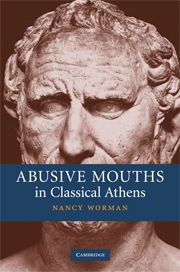Book contents
- Frontmatter
- Contents
- Acknowledgments
- List of abbreviations
- Introduction
- 1 The mouth and its abuses in epic, lyric, and tragedy
- 2 Open mouths and abusive talk in Aristophanes
- 3 Gluttonous speechifying in Euripides' Cyclops
- 4 Crude talk and fancy fare in Plato
- 5 Defamation and oral excesses in Aeschines and Demosthenes
- 6 The intemperate mouth in Aristotle and Theophrastus
- Epilogue
- Bibliography
- Index locorum
- General index
Epilogue
Published online by Cambridge University Press: 08 March 2010
- Frontmatter
- Contents
- Acknowledgments
- List of abbreviations
- Introduction
- 1 The mouth and its abuses in epic, lyric, and tragedy
- 2 Open mouths and abusive talk in Aristophanes
- 3 Gluttonous speechifying in Euripides' Cyclops
- 4 Crude talk and fancy fare in Plato
- 5 Defamation and oral excesses in Aeschines and Demosthenes
- 6 The intemperate mouth in Aristotle and Theophrastus
- Epilogue
- Bibliography
- Index locorum
- General index
Summary
“The endless fascination of those apertures and openings!”
Portnoy's ComplaintMany centuries after the waxing of the abusive lexicon that this study explores, the Byzantine commentator Eustathius extrapolated a connection to Hipponax from an incident in book 23 of the Iliad. There Ajax the son of Oïleus loses a foot race to Odysseus and ends up on the ground with a mouth full of cow dung (ἐν δ᾿ ὄνθου βοέου πλῆτο στόμα τε ῥῖνας τε, 23.777). Upon receiving second prize (an ox, fittingly enough), he spits the dung from his mouth (ὄνθων ἀποπτύων) and says, “Damn, the goddess tripped me up; she always stands like a mother by Odysseus and cares for him” (ὢ πόποι, ἦ μ᾿ ἔβλαψε θεὰ πόδας, ἣ τὸ πάρος περ/ μήτηρ ὣς ᾿Οδυσῆι παρίσταται ἠδ᾿ ἐπαρήγει). His audience of fellow warriors laughs happily (ἡδὺ γέλασσαν) at his remark, and the potential for shaming and conflict ends there (780–84).
Eustathius remarks, “… a mouth spitting like this might be called an opening of dung and filth (ὄνθου … καὶ βορβόρου ὀπή), a combination that … the harsh-tongued Hipponax used in insulting a woman as a ‘crap hole’ [βορβορόπην], mocking her for her unclean child-bearing” (iv.835.13 Valk). This chain of associations points to the continuation of an awareness about the nature of insult that extended from Homer and the iambic poets into late antiquity.
- Type
- Chapter
- Information
- Abusive Mouths in Classical Athens , pp. 319 - 324Publisher: Cambridge University PressPrint publication year: 2008



